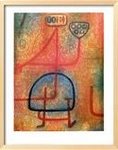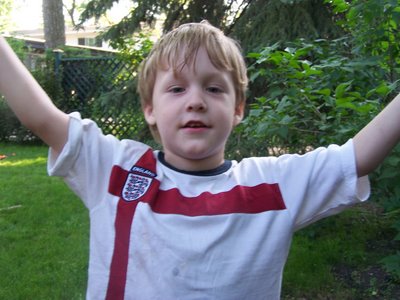I have perennially suffered from what I term "bad travel karma." When my father travels, he is routinely bumped up to first class, and given a free ticket for the trouble of having to move his carry-on bag. As for me, if there is a flight that sits on the runway for hours, without refreshments or air conditioning, I am on it, and in the middle seat, with a hyperactive toddler. The one flight canceled? That was my reservation. Luggage lost? I can fill out those forms with my eyes closed, and wonder to this day where my knickers have traveled. You could attribute my poor track record to flying in and out of O'Hare, as I have for the past twelve years -- but, truth is, I had been jetlagged and waylaid for years before I moved to Chicago.
Unfortunately my bad karma is currently preceding me as we prepare to move to Kingston, Ontario (to take up the most enviable academic appointment a freshly minted PhD could hope for). When I went for my interview, in late January, I had to dial only the seven digit phone number, without -1- and an area code, to call my interviewers (or simply next door). That's since changed. The cost of electricity has gone up so much in Canada in the past month, due to deregulation, that we are having to get gas lines directed to our house, and to rebuild the interior to accommodate them. Setting up a bank account is trying, what with parts of the Patriot Act forbidding the transfer of funds that might signal a terrorist account. Finally, there was that al-Qaeda plot discovered in Ontario recently, which I've been in denial about -- except for the part about it being foiled. Thank you, Canadian Mounties; Dudley Done Right.
But while I have been coasting this week on Jose's popularity and not been concerned with refreshing the blog, I have learned something news- (or blog-) worthy: there is a commercial embargo on moving to Canada in the month of July. That is, so many moving trucks are traveling up to Canada, and none coming down, that moving companies have had to impose a substantial financial penalty on those who insist on moving to Canada during the month of July; and some refuse to move anything northerly at all. Being skint, as we are, having not sold our house here, we are thus planning to move the first week of August.
I have to wonder whether our President been supplied this information, in his famous (or infamous) daily briefings. Debates over U.S. immigration have focused predominantly on who enters, or who has already entered, from the U.S. border to the south. Meanwhile, like an upwardly mobile, nationwide game of "there were ten on the bed, and the little one said, roll over, roll over," U.S. residents are spilling over the northern border into Canada, in droves. An accurate picture of U.S. immigration would have to take this development into account.
Meanwhile, if our truck manages to cross without further karmic retribution (for what? I'm not sure yet), I reckon I'll see many of you there soon -- our number is 1, 613, . . .
Friday, June 30, 2006
Coasting . . . and Bordering.
Tuesday, June 27, 2006
Clash of the Icons: Shakespeare, the Beatles, and Wayne Rooney
Those of you accustomed to reading my reflections on language and culture may have been a bit taken aback by my World Cup fever of late. For one thing, I have had few decent thoughts since I finished my dissertation revisions, and have reveled in analyzing sport instead of letters. For another, that translation of Jose + 10 does derive from my interest in language -- I started out in Spanish, went through several other assorted languages, before making a career out of sixteenth-century English. But since I've let my brain go soft in the past week, I've also become addicted to YouTube. I know what you're thinking -- especially since my late ode to iTunes -- aren't you a bit late to the game, Gwynn? Yes, dissertations will do that to you. But it's been so much fun finding these clips on YouTube, clips of things I love, thought I'd never see except randomly. I thus present to you three such clips that show how my passions do in fact intersect. . . all under the rubric of Anglophilia, I suppose, but not entirely. . .
In this first clip, we have the Beatles performing the "mechanicals'" performance of Pyramus and Thisbe, from Act V of Shakespeare's Midsummer Night's Dream (I write on Shakespeare).
This was evidently an attempt to have the Beatles attempt to match wits with the Bard, although at a very early stage in the Beatles' ascendance, in April, 1964*. . . Very forward-thinking, on the behalf of those who thought the Beatles might reach that status in England; and it's interesting, how the Ox-Bridge types in the audience attempt to put them down . . . are they consciously mimicking the rudeness of the mechanicals' gentle audience in MND?
In this next clip, we have Sesame Street -- a childhood icon of mine -- perform "Letter B." My dissertation concerns letters and spelling, so this clip is especially dear to me. I mentioned it -- even sang a bit -- during the Q & A at my job talk at Queen's University, though have yet to learn whether that counted for or against me . . . I doubt their other candidates were so unabashed.
You gotta love the floppy orange beatle wigs.
Finally, I present this hilarious video about English striker Wayne Rooney, which shows the lengths the British will go to to render an anthem for their favorite football players. Personally, I preferred "Michael Owen scores the goals, hallelujah!" (to the tune of "Michael, row your boat ashore"), but my beloved square-mugged Michael tore his ACL two minutes into the Sweden match (yes, I am indeed eating crow on that); Michael being from Liverpool, we might've had a chance at a Beatle coming up with a tune. This video nonetheless proves my point, however, about the intersection of British icons, and, if you watch it full through, brings us full circle . . .
Come on, weren't you a little bit inspired? I know, the lyrics are so painful they're funny ("Beckham's free, Beckham's free. . ."). I promise I'll get back to thinking when I can. In the meantime, a little TV in small doses can't hurt. . .
* When I first made this post, I had said that this program was shown in 1963, before the Beatles arrived in the States (in February, 1964); my error, I have corrected it. My point nonetheless remains the same.
Sunday, June 25, 2006
Jose + 10 Special Features!
The Making of Jose +10
Cool beans! (or frijoles . . .)
Sorry, I can't translate Kaka.
England v. Ecuador, 10:00 CDT
Listos!
Oye, tres, cinco, uno!/ Listen up! Three, five, one! Sven's midfield-heavy line-up for the match. Let's hope Lennon and Gerrard are starting, though I understand Carrick will be coming in. As for Beckham. . .
Tu, al banquillo! / You, to the bench, unless you plan on defending today.
On the flip side, England must play aggressively and score. Don't let the match go to penalties. (Ach!)
Post-match comment (11:52 CDT): Exhale. Going in into half-time, it did not look good. A shout out to Captain Becks for the special teams free kick -- but do we have to wait until he is vomiting on the pitch to sub him? That Lennon kid -- boy's a bit special. Get him in sooner. Thankfully, the team was energized by the Beckham goal, and played much better thereafter. Oye, Lampard?! Get where you need to be -- you were off pace in several plays. Finally, note to Sven: 3-5-1 is not going to cut it from here on out. You need someone to get Rooney -- no looker, but truly brilliant -- the ball.
Onward and upward. For those watching this afternoon: Portugal v. Netherlands should be a great match. And I can't wait for Argentina v. Germany. . .
Friday, June 23, 2006
R.I.P., Team U.S.A., Part 2
Finally, a sound assessment of the state of affairs. Weintraub doesn't trace the problem back to AYSO, as I did, but gives a credible account of how MLS contributes to U.S. disappointments abroad. He points out that, if we are going to build a truly competitive national team, US players should not be pressured to support the MLS (by playing in it), but instead be encouraged to play in the European leagues, in which the competition is stiffer -- and faster, as I have pointed out (i.e., watching the MLS is like watching the European leagues play in slow motion). What he also could have pointed out is that European players look at the MLS as we do Florida: the place to wind out their (slower, less agile) golden years. If I had a dollar for every time I heard a European player say he looks forward to moving to America (with his riches) to "retire" in the MLS . . .
But Weintraub's article is worth the read: http://www.slate.com/id/2144414/
Wednesday, June 21, 2006
Jose say what? A Full Translation of Jose + 10See the full ad here!
Consumer alert! I have posted a definitive edition of the ad's translation today, July 9, in honor of the World Cup Final, and working in all the suggested revisions. To read the most polished and comprehensive version, go to the new post.
Gracias!
*************
I've noticed that la Jardiniere has had several visitors interested in the Adidas Jose + 10 ads (which I admired in my June 14 post, "My favorite part of the World Cup so far. . ." ). Many have been looking for translations; I only translated a couple of choice lines then, so allow me to put my Spanish to further use. I don't know that it will get much airing in Kingston, Ontario; I'm just getting used to using the French pronunciation of my last name -- dooh-shjahr-deh[n] -- instead of the Americanized doo-jar-din. Not that I haven't enjoyed saying it, in French, without having had to spell it thereafter.
As for Jose and his amigo Chubby -- Gordito? -- the Jose + 10 ad goes like this. You can see the two ads that are out together in an extended version here:
As the ad opens, Gordito is bored, chilling out in an old arm chair (next to an abandoned car) outside, as Jose bounces a soccer ball off the wall nearby.
Gordito: Jose? Jugamos?/ Jose? Shall we play?
Jose: Si/ Yes.
The scene cuts to the courtyard where Jose and Gordito do their version of "rock, paper, scissors" to see who gets first pick of the players.
Gordito: Pares -- uno, dos y tres!/ Stop -- one, two, three! (They each throw a hand in, Jose loses.)
Jose: Ach!/ Ach! (the international language of frustration). Gordito gets first pick; the players arrive, running in from various angles of the courtyard, some in their native team gear, some more casual.
G: Cisse!/ Djubril Cisse, of France, who is injured for the Cup (broken leg).
J: Kaka!/ Kaka, of Brazil (remember, lots of them go by one name).
G: Zidane!/ Zinedine Zizane (Zizou), of France.
J: Beckham!/ David Beckham, of England.
G: Defoe!/ Jermaine Defoe, who plays for Tottenham, but is not playing for England in the Cup.
J: Kahn! Oliver Kahn, German goal-keeper, who won the "Golden Ball" (ringing Austin Powers?) at the 2002 World Cup.
G: Messi!/ Lionel Messi, of Argentina.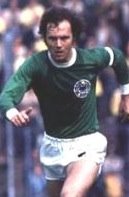
J: Mm, Beckenbauer!
G: . . . [realizing what Jose had just said] Beckenbauer!? ha ha ha ha ha ha ha/ The joke that they're sharing is that Jose has selected the player Franz Beckenbauer -- which sounds like "bake-un-bow-yea" in their idiom -- who was a German star (and former national team manager) from the late sixties and seventies (and an Adidas icon to boot).
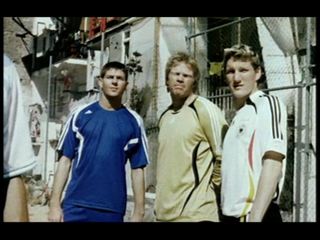 Just when they're laughing, however, Beckenbauer turns up, in the era-appropriate kit (and his old number, 5). Oliver Kahn, the current -- and great -- German goalie (in the middle of the photo to the right), is especially dumb-struck, and Beckenbauer approaches him first to shake his hand. Neat moment.
Just when they're laughing, however, Beckenbauer turns up, in the era-appropriate kit (and his old number, 5). Oliver Kahn, the current -- and great -- German goalie (in the middle of the photo to the right), is especially dumb-struck, and Beckenbauer approaches him first to shake his hand. Neat moment.
But having cottoned on to the kids' m.o., Zidane whispers in Gordito's ear the name of a French football icon from the late seventies and eighties, Michel Platini -- G: Platini! -- who duly arrives to hug his no. 10 heir, Zidane (i.e., Germans don't hug. . .).
The players are stretching, smiling, and getting to know each other while they warm up, but Jose and Gordito are all business.
G: Oye, Defoe!/ Listen up, Defoe! Gordito throws Defoe the goalie gear, surprising -- and amusing -- because Defoe is a forward; but we've established that these are the kids' teams, as Jose then makes explicit.
J: [the coin toss; Cisse stoops to pick it up; Jose swipes it from his hands] Soy capitan!/ I'm the captain!
G: [calling out to his players behind him] Oye, cuatro cuatro dos!/ Four four two! The standard soccer line up of four defenders, four midfielders, then two forwards, or strikers.
J: [to his team, very seriously] Cuidado Cisse, porque el corre muy rapido . . .vale? vale. / Watch out for Cisse, because he runs very fast . . . All right? All right. (Cisse nods and wags his finger in agreement).
G: [pointing to two players in his backfield] Lampard, Robben, venga, ramos!/ Lampard, Robben, come on, to the wings! (or sides, of the pitch, with a gesture that tells them to switch -- which they do). And that's Frank Lampard of England, and Arjen Robben, of the Netherlands.
The match begins when Jose shoves German player Michael Ballack to the side and says, pita!/ the whistle (has blown), and takes the first touch. I'm not going to call every touch of the match itself (unless pressed).
G:Vengamos! Venga, corre!/ Let's go! Come on, run!
Jose tackles -- okay, trips -- the rapidly advancing Robben, who considers it a foul. Jose shrugs off his protest with a clipped "sorry!" to continue play. . .
J: Aqui, Beckham!/ Here, Beckham! (who produces his trademark bending cross).
Kaka ends up with the ball, advances, shoots, and Defoe -- remember, a forward -- manages to deflect it, with a laugh. Jose, disappointed in Kaka, orders, Tu, al banquillo!/ You, to the bench! -- in which the joke is who benches Kaka?!-- but then he shouts, Duff, ven! / Duff, come! Damien Duff, of Ireland, comes in off the bench. Play continues.
G: Oye, Zidane!/ Hey, Zidane! (whom he passes the ball). Zidane to Cisse. As Cisse heads up the wing, Capitan Gordito yells something I can't make out (he's running, and huffing and puffing); whatever it is, he wants him to cross the ball in . . .
Lampard collects the cross and shoots; the goalie, Kahn, grabs it. G: Gol! Kahn: "Nooooo!" Lampard, and Gordito's team, consider it a goal. Jose and Kahn argue (in their respective languages) over the goal line when . . .
Jose's mother calls from the balcony: Jose!
J: Que?!/ What?
Jose's mom: A casa!!/ Come home! He shakes his head and throws up his arm in disappointment, and heads for home, as the camera pulls back to reveal noone on the "pitch," save for Jose and Gordito, reluctantly exiting their fantasy. . .
In my last post on the ad, I had expressed my desire to see who would win Jose's match (and how). Having watched it several times now, I think I was wrong to assume the match would continue over the course of the tournament -- I think it's over when Mama calls Jose home (which is apt). I would like to see it resume and reinvented, though, in some equally ingenious way.
In translating the ad to the letter (so to speak), I am also violating the spirit of the ad, which rightly supposes that kids all over the globe -- and fully-fledged grown-ups -- play "fantasy football," so that you don't need to know what Jose and his friend are saying to "get" the ad. After all, the body language -- e.g., Gordito's pre-match neck and shoulder roll -- speaks volumes. But knowing what they are saying, and appreciating the sly wit rendered by the kids' particular choices, adds an additional level of fun, no doubt.
It is also fun reading the international comments posted about the ad on YouTube: spettacolo, or spectacular, in Italian; simplesmente fantastico, simply fantastic, in Portuguese; Que grande anuncio y grande cancion! What a great ad, and a great song, in Spanish; and (we'll let the Germans have the last word here), Ich find sie ganz cool, I find this pretty cool.
As in any great ad, the music is sound (muy grande!) as well. In the first half, the tune is D'aloutte, by RJD2, which you can get on iTunes. In the second half -- that skimming "If you don't give my football back, I'm gonna get my Dad on you. . ." -- is by Jim Noir, the tune Eanie Meany. As far as I know, Jim Noir's album is supposed to be released on July 10. Sweet ride, that one, when you hear it in toto: http://www.jimnoir.com/.
As for Adidas, its close ties to the World Cup, and how the + 10 ads began (with all pros), there is an article on the English-language site of the German periodical Der Spiegel: http://service.spiegel.de/cache/international/spiegel/0,1518,420456,00.html.
Finally (talk about huffing and puffing), if you pick through the FIFA World cup site, you can also find World Cup players' "+ 10," or fantasy teams. Michael Ballack's, for example, is here: http://fifaworldcup.yahoo.com/06/en/060619/1/7wka.html.
One stop shopping, for all your World Cup promo needs!
Ole, ole, ole, ole . . .
England drew with Sweden 2-2 to progress to the knock-out stage; they play Ecuador on Sunday -- much better than Germany on Saturday! (and if it's Thursday, it must be Belgium. . .). The fact that they only drew with Sweden, though, does not bode well. They looked much more sharp in the first half -- more aggressive, more crisp, finding each other much better on the pitch. Joe Cole, in particular, was especially quick on his feet, depositing the first goal to put England on top.
The defense was abysmal, though, especially in the second half, when Sweden scored twice. Calling Captain Beckham? Stop yer bending and start defending. You were not marking your man when that Sweden goal went in, and would be to blame for at least two of those close calls. If soccer were played like American football, Beckham would be on England's "special teams," dispatched only to make corner kicks. Show some leadership, Becks, by requesting to come off (we know Sven wouldn't sub you), and have Lennon come in, if you're not up to playing all sides of the game. Overall, the team's response to Sweden's set pieces (i.e., from free kicks, corner kicks) was verstinken. Look to be on that Ecuadorian team like terriers.
Meanwhile, the folks at ESPN must have clued O'Brien in to his cluelessness -- resulting in an ear-bending stream of logorrhea read straight off of crib sheets and teleprompters. (Balboa, meanwhile, continued to issue his contempt for the England side. He's going to be dining out for days on England's defensive lapses. Just who are you rooting for, Marcelo?)
But it wouldn't be England if they didn't make us sweat. And they are through to the next round. Go England!
Sunday, June 18, 2006
Ode to iTunes. . . and a request.
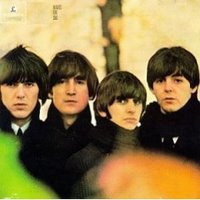 I love the Beatles. In fact, as I begin to write this (at half past one in the morning, diss not quite done, but June 18 nonetheless), Paul McCartney is enjoying the one birthday all us Beatle fans -- we Paul devotees, in particular -- have looked forward to (or dreaded): his 64th. ("Will you still need me, will you still feed me. . .") The song was his tribute to the kind of music he grew up listening to with his pianist Dad Jim (Happy Father's Day, natch). Of course, it's also the kind of loopy, hokey song that, had Paul performed it with Wings, we all would have despised. Context is everything. Because it was a Beatle song, and because it was on Sgt. Pepper, we consider it genius. John hated it. How sad that Julian (John's first son; whither Valotte?) ended up covering it for a commercial.
I love the Beatles. In fact, as I begin to write this (at half past one in the morning, diss not quite done, but June 18 nonetheless), Paul McCartney is enjoying the one birthday all us Beatle fans -- we Paul devotees, in particular -- have looked forward to (or dreaded): his 64th. ("Will you still need me, will you still feed me. . .") The song was his tribute to the kind of music he grew up listening to with his pianist Dad Jim (Happy Father's Day, natch). Of course, it's also the kind of loopy, hokey song that, had Paul performed it with Wings, we all would have despised. Context is everything. Because it was a Beatle song, and because it was on Sgt. Pepper, we consider it genius. John hated it. How sad that Julian (John's first son; whither Valotte?) ended up covering it for a commercial.
Of course, it's also sad that Paul really won't enjoy this day, what with his prettier-Linda surrogate wife Heather Mills not only divorcing him (no needing or feeding there!), but also planning to go on Larry King to tell us all about Macca's foibles and how she's been abused by the media. Ugh.
 It's weird, of course, that she's my age. I used to fantasize that Paul would collect me from my homeroom at Great Oak Middle School, in Oxford, Ct., to make me the youngest member of a rock band (he let Linda sing, why not me?).
It's weird, of course, that she's my age. I used to fantasize that Paul would collect me from my homeroom at Great Oak Middle School, in Oxford, Ct., to make me the youngest member of a rock band (he let Linda sing, why not me?).
But, truth is, I am interrupting my random World Cup noodlings here to issue an ode to iTunes. No, you can't get the Beatles catalogue on iTunes -- remember, Michael Jackson owns the rights to that, after Paul had advised him on the "Say say say" set that the only sure way to make money in music was through owning publishing rights. Ferget Jacko's nose or Julian's cover of "When I'm 64" -- every commercial I see with a Beatles song for a jingle makes me want to jump out the bathroom window. Just as exasperating, though, the "remaining" Beatles (what a gloomy phrase) continue to hassle Steve Jobs over brand image. Give it up, lads: we know the difference between a laptop and a pop group!
Besides, iTunes is allowing me to enjoy music in a way I haven't since the days of vinyl. Listening to Sgt.Pepper -- or Rubber Soul or Revolver or Abbey Road -- wasn't just about getting goosebumps from those groovy harmonies, or appreciating those sudden, Beatle-sharp shifts into a minor key. It was about studying the album art, reading the lyrics, and soaking up every available fact and figure (that makes me pretty hard to beat in a Beatles trivia contest).
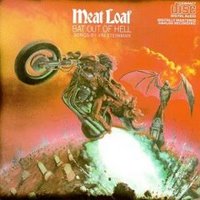 When CDs rendered vinyl obsolete, they also prevented a subsequent "Back in Black," "Bat Out of Hell," or "The Wall" from visually capturing our imagination and becoming an iconic cultural image. Remember the scene in Spinal Tap, when the record company rejects the band's idea for the cover art of Smell the Glove? Tee hee.
When CDs rendered vinyl obsolete, they also prevented a subsequent "Back in Black," "Bat Out of Hell," or "The Wall" from visually capturing our imagination and becoming an iconic cultural image. Remember the scene in Spinal Tap, when the record company rejects the band's idea for the cover art of Smell the Glove? Tee hee.
But I don't know the names of any songs released since 1986 -- never mind the lyrics (and not just REM). If I cared enough to try to prise that little booklet from the CD case, I promptly lost it, and broke the case, to be left with a mute little disc that, despite early claims that CDs were indestructible, ended up getting scratched and damaged. Nice coaster.
With iTunes, however, I feel like a teenager again. Not only is the music right there, and easily identified, on my PowerBook, but I can listen while I pour over the artist bio, study the album art, and see if Big Brother at iTunes is right, that because I purchased Pet Sounds, I might also like the Pixies' Doolittle (I do!), or coz I bought If You're Feeling Sinister, I might like The Fiery Furnaces (eh, not so much). I'm a junkie again, and I love it.
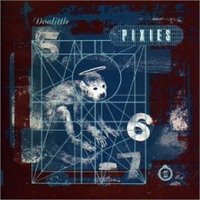
My one request -- besides forcing Macca and Ringo to give it up, and Jacko to allow iTunes to distribute the catalogue -- is to do more with the album art. A thumbnail at the corner of the screen isn't enough -- it's too small, and distracting more than anything. Why not split the screen between the cover and the info? Or program it so the album art temporarily becomes the computer wall paper? If iTunes is helping to make music consumption the varied sensory pleasure it was with record albums, they could enhance this experience even more.
Freebird!
Friday, June 16, 2006
Go Figure: World Cup Ratings Soar . . . but is it Best in Show?
My sources at ESPN have shared with me the ratings from ESPN and ABC World Cup telecasts this past week, and, my, they are pretty impressive. Despite uninspired play by tournament favorites so far, the ratings are up from four years ago in each corresponding match by, at the very least, a whopping 56 percent, and that was the match between Mexico and Iran (!). England's match against Paraguay bested the '02 match in that time slot by 63 percent, and that fantastic Trinidad & Tobago draw with Sweden marked an 85 percent increase in viewers since '02. Finally, Monday's ESPN telecast of the U.S. match against the Czech Republic was seen in an average of 2.14 million television homes: the most-watched and highest-rated soccer telecast ever on ESPN2, as well as the highest-rated program on ESPN2 this year (clearly beating the spelling bee; sorry, kids! Let's just hope you don't end up on the "ocho").
I am awaiting word on the demographics to assess this significant development. Are intellectuals abandoning McSweeney's for their nearest sports bar, as reported in Slate.com? Have women been heeding my call to leave the box scores to their male folk and check out the square mug of Michael Owen? Or have US citizens grown weary of being a global pariah and decided to rejoin the international community (without UN approval) through some sporting R & R? It will be interesting to see if the ratings hold up once the US team exits the competition. My hunch -- based on returns at our local, the Celtic Knot -- is that they will.
That said, what remains to improve in the telecasts -- besides England's offense -- is the commentating. Groan. As is usual in competitions of this magnitude, producers have paired a wonky former player-expert (Marcelo Balboa, late of the MLS team the Colorado Rapids) with an experienced broadcaster (Dave O'Brien) less familiar with the sport. In the matches I have watched (only a few, I've got a degree to finish here), the wonky former-player Balboa takes soccer very seriously. Too seriously. At our expense. As is typical of inexperienced announcers, Balboa abhors a telecasting vacuum. But even more unfortunate, he fills that vacuum with his considered and emphatic prejudices about the team he no doubt hopes will lose. Get this guy some stats or some stories, or another wonky guy to spar with on air, to make his repeated pronouncements of death remotely dynamic or interesting. He's a downer.
But the real disaster is Dave O'Brien. "The score is nothing to nothing"? That's nil-nil in soccer, Dave. I poked around, and found this very trenchant and accurate assessment of Dave O'Brien's skill in the booth (this from Copia [http://copia.ogbuji.net/blog/2006-06-09/Misery__AB]:
I think I can summarize his knowledge of football thus: He knows that the ball is round and that the goal's net is not made of barbed wire, but he knows hardly anything beyond that. Marcelo Balboa was constantly having to interrupt to correct O'Brien's laughably wrong assessments of matters on the pitch. Just to give one mad-cap example, a Costa Rican defender stuck out a hand to pull Schweinsteiger's shirt in the box. Schweinsteiger (I think it was him, but I might be remembering incorrectly) dove and the ref ignored him. It was one of those cases of: sure it's technically a foul, but far too minor to merit a penalty. O'Brien, however, took this as an opportunity to say: "That just shows that the idea that you cannot use your hands in soccer is a complete misnomer". As such he managed to 1) misuse the word "misnomer", 2) confound the the many possible senses of the term "use your hands" 3) ignore the fact that shirt-pulling is illegal in football.
Well said, and too true (and especially appreciated by la Jardiniere for having pointed out O'Brien's misuse of language).
Upon relating O'Brien's malfeasance to my pal Colleen (not the first time she has appeared in this blog, and surely not the last), Col reminded me of the most keenly observed depiction of the Dave O'Brien phenomenon, in 2000's dog show satire, Best in Show. Remember Fred Willard's turn as Buck Laughlin, the color commentator assigned to the dog show?
¶ "Now tell me, which one of these dogs would you want to have as your wide receiver on your football team?"
 ¶ "And to think that in some countries these dogs are eaten."
¶ "And to think that in some countries these dogs are eaten."
¶ "I went to one of those obedience places once... it was all going well until they spilled hot candle wax on my private parts."
Classic. But as Col pointed out, Buck's best turn may have been in demanding from the bloodhound what he considered the proper grooming: why doesn't the dog wear a Sherlock Holmes detective hat and carry a pipe in his mouth? Really, why not?
Dave O'Brien is like dat.
Of course, to my knowledge, he hasn't poked fun at a blind guy for wearing sunglasses indoors. But almost five weeks remain in the tournament. You never know. Stay tuned.
Wednesday, June 14, 2006
My favorite part of the World Cup so far . . .
. . . is not the US rout by the Czech Republic. If you read my post below, you know I wanted them to do well. And England hardly fared better, winning off an own-goal by Paraguay (off a cracker Becks kick, I know, but still: I'm expecting them to blow their group lead in their match against Trinidad & Tobago, and five bucks -- pounds? loonies? -- says it's Gary Neville who blows it. You heard it here first).
No, you know I am no corporate shill, but I am just loving the Adidas Jose + 10 ads. They start as so many kids athletics -- or Barbie, or sandbox, or train -- diversions do, with two kids selecting the sides for their fantasy teams. "'Zidane!' 'Beckham!' "etc. In the commercial(s), however, the players the kids choose actually (and bemusedly) turn up in the flesh (so to speak), in the sandy littered courtyard where Jose and his opponent apparently live. With their rosters complete, the diminutive Jose and his slightly portly friend then square off, amid hanging laundry, and bark orders in Spanish (no se habla ingles aqui) at their multimillionaire international starters.
I especially love the part when Jose's chubby opponent -- will he get a name, I hope? -- rolls his neck and cracks his shoulders in preparation for the match, just before Jose gets the first touch at midfield. "Cuatro cuatro dos!" Chubby shouts (Four four two! -- a standard soccer line-up). "Listos?!" (Ready?!) Then the match begins. And a fun match it is (so far), with the ball careening off walls and abandoned automobiles, and the players having to defer to the imperious authority of their pre-adolescent player-coaches ("Soy capitan! [I'm the captain!]).
A German company, Adidas already stands to do well from the fact that the World Cup is taking place in the homeland this year. But where Adidas has also outflanked Nike in this ad is in connecting the joy of playing -- and watching -- soccer to two kids as unlikely to attend the World Cup as my elderly Auntie Claire. In particular, where the Nike ads focus on the childlike exuberance of World Cup players (Ronaldinho, Wayne Rooney), these ads go from the opposite angle, showing the devotion of two unknown, but no less inspired, youngster footballers, and enlisting professionals to play in their world. It's a pretty captivating fantasy.
Of course, what Adidas has also done is create a narrative that illustrates that each match tells a story -- and, in all honesty at this point, I am more excited to find out who wins -- and how, and why -- in Jose's match, than finding out who wins the next crop of World Cup fixtures! Pathetic, I know (especially given the ad's class politics), but's it's damn fun viewing. They got me.
I found a link to it here (and forgive me the flatulence, not my idea):
http://flatulence.blogspot.com/2006/06/adidas-commercial-jos-10-extended.html
Cuatro cuatro dos! Listos!
Monday, June 12, 2006
Accent ecoute?
I have been making lots of phone calls to Canada in preparation for our move to Kingston, Ontario. And I've been making a fool of myself in the process. The last such folly was in a call to Cogeco, the company who will supply our cable TV and internet service. Looking out for my British husband's interests -- and fatigued after a long day of making arrangements -- I blithely queried whether they carried BBC America. Radio silence. Then the reply, a terse no.
Ahh, that's right: it's Canada. Why would Cogeco carry a channel packaged for the United States (the US having coopted "America" from North America, Canada laying claim to the "true North")?
Again, tired and addled, but realizing my mistake, I laughed out loud -- too loud, no doubt -- so American.
"We carry BBC World." Again tersely stated.
Meanwhile, I'm still chortling giddily on the line. (Stupid American.)
While I managed to finish the conversation having secured a cable package fit for a king, I continued to chuckle at my slip, and wonder how it is that I can switch lexicons as soon as the aeroplane touches the tarmac at Heathrow -- I know to say autumn instead of fall, to ask for a lift (ahem) instead of a ride -- but fail to converse properly with my future neighbors in Kingston (the first English capital of Canada, and proudly Loyalist for much of its history). I've already misspoken several times preparing for my post at Queen's University -- it's a term, not a semester, and they're second-year students, not sophomores. But what kind of fool will I make of myself in the classroom? Ordinarily a confident speaker, and an organized teacher, I have visions of students snickering to themselves (discreetly) throughout my lectures on Renaissance poetry. Stupid American -- how can she teach us English literature?
Thankfully I have a couple of months before I stand at the lectern (time I will devote to going Canadian). But I also realize that the facility I have in shifting to British English comes from the oral cues I hear -- the accent. While Canadians pinch their vowels (and end their sentences with "eh?"), and I hear the difference between Canadian and US varieties of spoken English, that difference is not enough of a cue to prompt me to adapt my vocabulary.
Hmmm. Flash cards? Berlitz? All-nighters with the Kids in the Hall?
Friday, June 09, 2006
Between the Posts: A Thinking Woman's Guide to the Men's World Cup

There are several perks to marrying an Englishman -- and no, I’m afraid I’m not charmed by the accent (when we met, my husband’s Oxfordshire dialect was truly inscrutable, and after ten years of marriage, I don’t care if the children need a baath or a bahth -– just get the urchins, er, darlings, in the bleedin’ tub). But as for the perks: first, as I have recounted before in this blog, Oxford, England, is a pretty sweet destination when you have to travel to visit the in-laws. Next, I love pub gardens, and (my hips don’t lie) I happen to like heavily larded, starchy food. I listened to the Arctic Monkeys (and James Blunt and Coldplay, etc.) long before they were over-hyped here.
And if you’re a language enthusiast as I am, when you procreate with an Englishman you enjoy a burden of riches when choosing a name for your son’s private parts. Pee-pee? Hoo-hoo? Pfft. Nothing suggests the impotence of our language more than the limp handles I hear in family lavatory stalls. Marry an Englishman, though, and your boy can have a willy, knob, or winkle. Chopper, plonker, or savaloy. Twig (and berries), meat (and veg), or John Thomas (and his two swingers). See Monty Python’s The Meaning of Life if you require a more thorough schooling -- we settled on “tadger.” This milestone behind us, we were free to devote ourselves to other rites of English manhood, such as throwing ourselves into the men's World Cup.
Every four years, a crop of Europeans (e.g., Geoffrey Wheatcroft) and former ex-pats (e.g., Adam Gopnik) deign to inform us why the rest of the world watches World Cup soccer and why Americans don’t, or shouldn’t, or should. We’ve read it all before: for the next six weeks, tens of millions of world-wide soccer fans will call in sick, stay up late, carry radios, crowd the telly, and otherwise put themselves and their countrymen out so as not to miss a minute of play by their national side.
Meanwhile, for Americans, it’s always the same litany of ills: soccer’s a rich kid sport – it’s boring, just a bunch of players running around – there’s not a lot of scoring – and heck, some games even end in a tie! What’s the difference between World Cup soccer and my kid’s “everyone’s a winner” AYSO game this weekend? How can we rally around a sport we can’t be sure we will win? (Yes, I am still talking about soccer, and not U.S. foreign policy.)
As our pastimes should say something about us as a people, the journalists use the quadrennial exercise to illuminate differences in national character, when in fact, disparities in world-wide attitudes toward soccer reveal global similarities in tropes of masculinity. On one level, the barroom conversation that soccer inspires in our country amounts to an international tadger competition -- "our sports are bigger and better than yours." On another level – I hate to say it, Mia, but somebody’s got to – the American soccer scene has yet to galvanize because so many think it’s a sport for girls. As U.S women’s soccer achieved world dominance (along with the U.S softball team), soccer in America became increasingly emasculated, more about baring sports bras than penetrating the net.
But fret not, gentle countrywomen, or consider such boorishness cause for despair. For while Julie Foudy, former U.S. women’s captain, is game to call the men’s World Cup on the Fox Sports Channel (as she did four years ago), I have yet to read a rousing homily on World Cup soccer written by a female transnational, or, even better, a foreign female player.
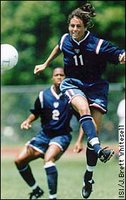 Indeed consider the alternative, if we lived abroad: while women in America have advanced in sport (thanks chiefly to Title IX, which guaranteed them the opportunity to play competitively in college), in the many nations devoted to the “people’s game” -- so-called because all you need to play soccer is a ball of some kind -- women sit in the stands, at home, somewhere far off the pitch. From this perspective, our ignorance of men’s World Cup soccer testifies to one instance of national, or federal, insight (pass the ERA and pay us dollar for dollar, and I'll gladly withstand some sports-related boorishness).
Indeed consider the alternative, if we lived abroad: while women in America have advanced in sport (thanks chiefly to Title IX, which guaranteed them the opportunity to play competitively in college), in the many nations devoted to the “people’s game” -- so-called because all you need to play soccer is a ball of some kind -- women sit in the stands, at home, somewhere far off the pitch. From this perspective, our ignorance of men’s World Cup soccer testifies to one instance of national, or federal, insight (pass the ERA and pay us dollar for dollar, and I'll gladly withstand some sports-related boorishness).
Soccer will never displace baseball or football in the hearts and TiVo WishLists of men, as a quadrennial tournament supplies neither the ritual nor reward that US sports fans expect (annually) from our resident athletic contests. But just as most learning curves favor women, and many men will spend the summer pouring over box scores or glumly waiting for training camps to open, the smart woman can tune in to the men’s World Cup: allow me to offer a primer.
It feels gratuitous to bring up the beekcake factor, but seeing as it's indisputable, let's get right to it. Sure, David Beckham looks nice in a skirt: if soccer produces one thing, it’s a set of nice legs. But allow me to submit for your consideration one Michael Owen, a striker (goal-scorer) from Liverpool, England.
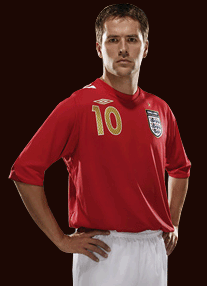 My, has he matured nicely. Owen rocked the soccer world eight years ago in the '98 World Cup, with a goal that took him dashing and gamboling with the ball from the midfield line past one Argentinian defender, then another (!), to finish by toeing the ball well over the head of the befuddled goalkeeper and into the back of the net. Men cowed at the offensive trifecta -- I marveled at Owen's sheer grace, his ability to anticipate the defenders' movement (before even they knew how they would move), and dodge and feint on his feet to speed right past them. If you complain that a sport played only with the feet can’t be challenging, I dare you to dribble a ball past merely an immovable object (or your nearest Argentinian). And if you usually tune in only to figure skating or gymnastics, you won't be disappointed by what is truly a breathtaking display of poise and agility, and, even more impressive, a routine being made up on the spot, (indeed) on the fly.
My, has he matured nicely. Owen rocked the soccer world eight years ago in the '98 World Cup, with a goal that took him dashing and gamboling with the ball from the midfield line past one Argentinian defender, then another (!), to finish by toeing the ball well over the head of the befuddled goalkeeper and into the back of the net. Men cowed at the offensive trifecta -- I marveled at Owen's sheer grace, his ability to anticipate the defenders' movement (before even they knew how they would move), and dodge and feint on his feet to speed right past them. If you complain that a sport played only with the feet can’t be challenging, I dare you to dribble a ball past merely an immovable object (or your nearest Argentinian). And if you usually tune in only to figure skating or gymnastics, you won't be disappointed by what is truly a breathtaking display of poise and agility, and, even more impressive, a routine being made up on the spot, (indeed) on the fly.
Of course, if long, lean and lanky is more your style, you must see the swift gait of French forward Thierry Henry.
 A genius goal-scorer, with legs my own height, the man is indubitably half-gazelle. A key player in (England club) Arsenal’s offense, Henry will be essential to the French line-up this year, especially as French captain, Zinedine Zidane (“Zizu”) looks ready for his retirement. As for Michael Owen, the former boy-wonder has lost some pace since ‘98, having suffered a crippling hamstring injury and eight years of professional play having taken its toll. But England is counting on Owen this tournament, as his superstar successor, Wayne Rooney (sorry, no looker, kinda looks like a bulldog) injured his foot. (Without fail, the crucial player from England always gets injured just prior to the World Cup; it was Beckham in ‘02.) I think Owen will be up to the challenge. He has matured nicely, and while he has lost that ingenue's indifference to "you can't do that," his experience will prove vital to the England side. Both Owen and Henry will score when it counts.
A genius goal-scorer, with legs my own height, the man is indubitably half-gazelle. A key player in (England club) Arsenal’s offense, Henry will be essential to the French line-up this year, especially as French captain, Zinedine Zidane (“Zizu”) looks ready for his retirement. As for Michael Owen, the former boy-wonder has lost some pace since ‘98, having suffered a crippling hamstring injury and eight years of professional play having taken its toll. But England is counting on Owen this tournament, as his superstar successor, Wayne Rooney (sorry, no looker, kinda looks like a bulldog) injured his foot. (Without fail, the crucial player from England always gets injured just prior to the World Cup; it was Beckham in ‘02.) I think Owen will be up to the challenge. He has matured nicely, and while he has lost that ingenue's indifference to "you can't do that," his experience will prove vital to the England side. Both Owen and Henry will score when it counts.
But of course a soccer tournament is not just about one player scoring -- nor is it only about England and France (don't tell my husband, and I won’t take the French defeat personally). Viewers who complain that soccer is just 22 men running around for 90 minutes -- and let's just pause to consider the last time you ran around for 90 minutes, with only one break, and no TV time-outs (one reason soccer doesn't play for the networks here) -- never made it past Candyland or Chutes and Ladders to play a good game of chess. In chess, each piece has its assigned role -- the bishop can move diagonally, the rook back to front, side to side, but collectively the pieces are moving together, which is to say, they share the same goal: to capture the opponent’s king, and defend their own. Within this framework, the pieces can vary their play -- the pawn can go diagonally to capture, for example, and that rook -- whoops, castle! And they all can be sacrificed, save for the king, to fulfill the team’s purpose, to knock out the opponent’s king.
Now put chess on legs (and nice legs at that), on a table ten to twenty yards longer than an American football field. If they televise the matches properly, from about half-way up the side of the stadium (not at the level of the pitch itself) you should be able to observe the chess-like moves as players move forward to pursue the king (with a goal), or backwards and sideways to defend their own net. The ball moves diagonally, side to side, and then, whoops! a huge forward pass (a castle!) and the striker takes it from the side-corner to approach the net. Each elegant, precisely placed pass, or ugh-inducing, miserably botched one, constitutes a turn in an ongoing contest of endurance, a sport which rewards foresight and patience as well as athleticism. The euphoria you witness from players when they score -- Peter Crouch, on England's side, is currently getting coverage for his "robot" -- is the elation you feel when you’ve reached a check-mate. And if we're going to grant that the international soccer scene thrives on tropes of masculinity, the sexual analogy is an old but an apt one, as minutes and minutes of pleasurable and exhausting foreplay are rewarded by an climactic, exultant finish. (Gooooaaaaallllll!)
For the most unbelievable, inventive, creative, just crazy-ambitious plays, watch the Brazilians. For sure, they're not pretty up close (though you gotta love the names: Ronaldinho? Where can I get a name like that? Jardininho? I like it.)  But the Brazilians amaze for their flair and finesse and for making plays happen. Joga bonita? Too true. Four years ago I was up at 3 in the morning nursing my son, a feeding scheduled to watch the World Cup England-Brazil match played in Japan. England was up, incredibly, just before half-time, when bloop! Brazil scored. Five minutes into the second half, and bloop! Brazil scores again. Within ten minutes of play, Brazil scored two incredible, gob-smacking (and in this household, heart-wrenching) goals. You may have already seen the Nike commercial in which former French footballer Eric Cantona (filled out considerably since his playing days) observes a toothy, ever-smiling, tween Ronaldinho play soccer with such enviable joy. The Brazilians all play that way, blithely disregarding the "you can't do that" factor as a team, gleefully throwing caution to the wind.
But the Brazilians amaze for their flair and finesse and for making plays happen. Joga bonita? Too true. Four years ago I was up at 3 in the morning nursing my son, a feeding scheduled to watch the World Cup England-Brazil match played in Japan. England was up, incredibly, just before half-time, when bloop! Brazil scored. Five minutes into the second half, and bloop! Brazil scores again. Within ten minutes of play, Brazil scored two incredible, gob-smacking (and in this household, heart-wrenching) goals. You may have already seen the Nike commercial in which former French footballer Eric Cantona (filled out considerably since his playing days) observes a toothy, ever-smiling, tween Ronaldinho play soccer with such enviable joy. The Brazilians all play that way, blithely disregarding the "you can't do that" factor as a team, gleefully throwing caution to the wind.
By contrast, the German side is all achtung, baby. Germany scores one goal, then positions its players in front of their net to defend for the remaining minutes of the match, as if you surrounded your king with your most powerful pieces and then only fiddled about with your pawns. Maybe you relate to such caution. For me? Boring. Cowardly. Blech. But Germany wins that way, or used to. In the last Cup they were in a transition from the old guard to the new, but still made it to the final; this time they are at full strength and have home-pitch advantage. I filled out the Cup bracket, and while I would love to see an England-Argentina final, it's hard not to foresee a Germany-Brazil rematch, the home team versus the reigning champs. If that's the case, it will be entertaining if only to witness two patently different styles of play, and yes, two distinct national characters. What do you want in your man, stoic caution or romantic ingenuity? Cast your wager accordingly.
Who else should you tune in for? If it's swarthy, and stereotypical, machismo you go for, look for the Italian and Argentinian teams. The Italians play rough, and the Argentinians? Well, they're not known for fair play (Google "Diego Maradona" and "the hand of God"); if the kids are nearby, you are bound to witness a “teaching moment.” If precision interests you, and you demand that your office or household run like a Swiss watch, the Holland team offers measure in great measures. The Central American teams (Mexico, Costa Rica) are free-flowing, like a cool Margarita after a long graft in the garden. And, as in the Olympics, Eastern European teams have begun to fare well, the most recent surprise being Croatia; in this tournament, the Ukrainian team has a good chance to upset.
 They are not only blessed with the gifted Andrei Schevchenko, but they also thrashed the other teams in their qualifying group (the first team to qualify for the World Cup), thus proving themselves competent as a team. Finally, it being a World Cup, Far East (Japan, South Korea), Middle East (Saudi Arabia, Iran) and African (Ghana, Angola) nations field teams; while none of these teams are expected to contend, they are worth tuning in for to witness the enthusiasm their fans show in seeing their teams play on an international level, and for what compelling geo-political match-ups might take the pitch (e.g., Iran v. US in the last World Cup).
They are not only blessed with the gifted Andrei Schevchenko, but they also thrashed the other teams in their qualifying group (the first team to qualify for the World Cup), thus proving themselves competent as a team. Finally, it being a World Cup, Far East (Japan, South Korea), Middle East (Saudi Arabia, Iran) and African (Ghana, Angola) nations field teams; while none of these teams are expected to contend, they are worth tuning in for to witness the enthusiasm their fans show in seeing their teams play on an international level, and for what compelling geo-political match-ups might take the pitch (e.g., Iran v. US in the last World Cup).
Of course, our household will be rooting for the three lions of England, but it would be unpatriotic — and unfeminist -- of me, however, not to conclude with some reflections on the US team, however sadly they do tend to disappoint.  From a competitive standpoint, the US suffers from a lack of speed (comparatively, it's as if they run and pass in slow-motion) and (again sadly) a lack of confidence, as if they have internalized the nation's indifference to them and have to prove to us that soccer is a sissy sport. Logistically, the US team suffers because, despite AYSO’s claim on family weekends nationwide, the program is not a feeder system. In the countries in which soccer is revered, boys are not only kicking cans at the first opportunity, but the schools and national football associations are also looking out for talented five year olds to deposit immediately in the nearest training camp. My husband was taken out of school at fifteen to play for his local side. Needless to say, we won’t let that happen here: while we are a sports-obsessed culture, and the NBA continues to pluck the occasional prodigy straight out of high school, many professional sports still run through college first. AYSO is age-limited, like Menudo, and no connection exists between AYSO and the sports children take up later, at school -- sports in which they are gender segregated.
From a competitive standpoint, the US suffers from a lack of speed (comparatively, it's as if they run and pass in slow-motion) and (again sadly) a lack of confidence, as if they have internalized the nation's indifference to them and have to prove to us that soccer is a sissy sport. Logistically, the US team suffers because, despite AYSO’s claim on family weekends nationwide, the program is not a feeder system. In the countries in which soccer is revered, boys are not only kicking cans at the first opportunity, but the schools and national football associations are also looking out for talented five year olds to deposit immediately in the nearest training camp. My husband was taken out of school at fifteen to play for his local side. Needless to say, we won’t let that happen here: while we are a sports-obsessed culture, and the NBA continues to pluck the occasional prodigy straight out of high school, many professional sports still run through college first. AYSO is age-limited, like Menudo, and no connection exists between AYSO and the sports children take up later, at school -- sports in which they are gender segregated.
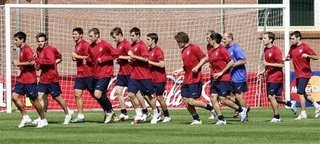
For indeed we might also consider how AYSO differs from other national youth sports programs, in that boys and girls play soccer together. Learn sportsmanship, fair play, get some fresh air and exercise. Follow that ball around the field like a frenzied swarm of bees. (Kick it, somebody, anybody, kick it!) It is possible that a program that led many to believe we would become a soccer-obsessed nation had the opposite effect precisely because its messages — “everyone plays,” even girls -- were contradicted, long-term, by the messages of more institutionalized sports, as well as the institution of gender difference, which Title IX inadvertently reaffirmed. We are indifferent about soccer because it lies along the fault lines of national ideas about sport, and yields no clear basis on which to develop either a coherent fan base or a tradition.
Which leaves it to our national men’s side to prove that soccer is competitive (for both men and women), by going out there and proving they can compete. Tadgers out, men! Get stuck in! Women’s soccer — the soccer nation? -- is counting on you.
Wednesday, June 07, 2006
As D-Day Approaches . . . some reflections on my purpose here.
I defend my dissertation on July 7. "Reforming (Men of) Letters: English Language Reform and the Formation of English Literary Identity (1540-1660)." Oh yeah, it's a gripping read.
Shall I bother to translate? Well, it goes something like this: we are accustomed today to thinking of English as a literary language, capable of communicating compelling ideas in an inventive, if not entertaining, manner. The English person "of letters" is also a familiar figure: whether highly knowledgeable about the language and its literature, as with university professors, or contributing to its literary tradition, as do contemporary poets, essayists, and novelists, men and women who study the English language and know what things are possible with it form a pretty select group.
(In many respects, the latter phenomenon follows from the former: that is, the esteem we tender our teachers and writers flows from the value we assign our language, our belief that English is sufficiently worthy that those who make a profession of it deserve our admiration and respect. And it follows inversely as well, that when contemporary writers and university English departments come under fire, it is usually because these presumed arbiters of language and literature are thought to have reneged on their custodial obligations. It's an absurdly tough racket.)
But to "men of letters" in the beginning of the sixteenth century -- men trained in the literary classics of ancient Greece and Rome -- none of this would have made any sense. At that point in time, English was thought to be rude, crude, and unfit for transmitting literature or learning. You learned the vernacular by happenstance, at home and through daily conversation, and no manuals existed (grammars, dictionaries, etc.) to teach "correct" or "proper" forms of the vulgar language, the (emphatically female) mother tongue.
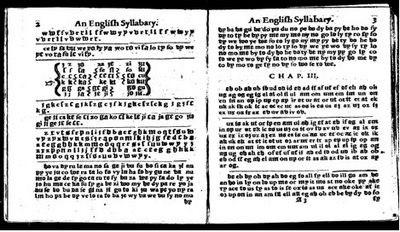
 The first such attempt to regulate English took place during that century, and while we are also accustomed to thinking of sixteenth-century writers such as Shakespeare as icons of English literary culture, benchmarks of vernacular accomplishment, part of their task in electing to write English literature was to reform both the form -- the spelling, grammar, syntax, and vocabulary -- and the reputation of the language itself. My study shows what part the first spelling manuals and elementary textbooks played in their efforts, to give rise to a distinctly English literary identity -- a man of English letters, and an occupation worthy of social esteem.
The first such attempt to regulate English took place during that century, and while we are also accustomed to thinking of sixteenth-century writers such as Shakespeare as icons of English literary culture, benchmarks of vernacular accomplishment, part of their task in electing to write English literature was to reform both the form -- the spelling, grammar, syntax, and vocabulary -- and the reputation of the language itself. My study shows what part the first spelling manuals and elementary textbooks played in their efforts, to give rise to a distinctly English literary identity -- a man of English letters, and an occupation worthy of social esteem.
With esteem in mind, I thank those of you who have gotten in touch to say you're enjoying la Jardiniere. Virtually all of you have wondered "where I find the time," what with dissertations to finish, houses to buy and sell, children with birthdays and unfortunate injuries, processing the family's immigration to Canada, and, of course, maintaining the garden. To be honest, the blog has become my down (you could even say "me") time. Besides the Bee last week, I can't remember the last time I watched television (actually, I think it was that American Idol finale). I only just cracked open a new book last night -- Philip Roth's American Pastoral.  I chose that book in particular because it is one of the many novels selected in the recent NYTimes Book Review survey (of the best novels of the past twenty-five years) that I haven't read. It is a graduate school parlor game to confess what classics in English (or American) literature you haven't cracked. (Erm, "Call me Ishmael?" That's about it for me in that one.) No doubt I am susceptible to the charge of being an "out of touch" academic, my head buzzing more about middle English alphabets than the Pulitzer prize winners published in my own lifetime.
I chose that book in particular because it is one of the many novels selected in the recent NYTimes Book Review survey (of the best novels of the past twenty-five years) that I haven't read. It is a graduate school parlor game to confess what classics in English (or American) literature you haven't cracked. (Erm, "Call me Ishmael?" That's about it for me in that one.) No doubt I am susceptible to the charge of being an "out of touch" academic, my head buzzing more about middle English alphabets than the Pulitzer prize winners published in my own lifetime.
The role of the academy came up several times in critics' discussion of the Book Review's list (on a dialogue on the NYTimes online, on the Charlie Rose show, on NPR, etc.; really, that Sam Tanenhaus was everywhere), and suffice to say, it often did not come off well. The programs illustrated the internecine conflict that unfortunately exists among those "of letters" in contemporary society, which is to say, between the academic literary profession and the guild of literary journalists.
If I can say something in the academy's defense (and I should divulge that my grad school compatriots can attest that when it comes to the "let's slag off academia" parlor game, I have few peers), it would be to foreground the role and importance of peer review in the profession. Such a process has its undeniably deleterious, and frequently publicized, effects: the botched tenure cases (for many critics, tenure itself), the rampant politicking, and the way academics converse in a language little resembling spoken English (see my own dissertation title).
As in any profession, such as law or medicine, roofing or plumbing, jargon enables practitioners to communicate with a degree of specialization befitting their mutual expertise; and while the specialized language functions to exclude those who have not passed through the requisite, and torturous, professional gauntlets -- an effect especially denounced in literary studies, by those who suppose it our task to make literature more accessible, not less -- it also, at some level, testifies to the good faith effort of many such professionals, and I am including myself here, to arrive at just the right, if admittedly abstruse, words to communicate complex ideas. In my profession, for better and for worse, I have to argue and defend my points of view and the words I choose to express them ("why 'formation' and 'identity'" in my title, for example -- I expect these questions at my dissertation defense, and must come prepared to answer them).
Literary critics are no less committed to their craft, and are subject to the critical, and often punishing, review of the general interest reader (visit The Fray on Slate magazine to see some real humdingers). But the selection and transmission of ideas in literary journalism is guided, some might say misguided, by special interests as well, i.e., those of the general marketplace. After all, editors have got to move mags and increase downloads to keep the whole operation afloat, and it is a tough racket deciding which ideas are worthy, and which will sell. But the very ubiquity of (Times Book Review editor) Sam Tanenhaus signaled that the Times survey was as much about promoting the Times Book Review as it was an occasion to discuss what makes a great book.
Indeed, what did not come out in the NYTimes discussions, that should have, is the role that mass marketing machines play in the construction of contemporary literary taste. Have we -- academics, critics, the general interest reader -- had any say in our three-year inundation by The Da Vinci Code? If literary critics wish to claim from the academy a certain jurisdiction over language and literature, I am more than glad to cede them the power to counteract, or merely complicate, the considerable clout of publishing house ad copy. Both academics and critics suffer in the popular imagination: if academics are thought to be "out of touch," critics are often said to be pretentious and self-aggrandizing (think of the reader who claims "never to listen to critics"). Would that we men and women of letters could talk to one another, and to the general readership, more effectively, in keeping with our mutual interest in our tongue.
I started this blog in that very spirit, and because I wanted to transmit ideas about language in contemporary culture, but did not have the time nor the patience to sell my ideas to editors, who weren't buying (and being a grad student for so many years, I am used to giving my ideas away for free!). I have done freelance work before (in graphic design) and know that in the beginning, ninety percent of your time is devoted to hustling new work. Nah. I've got a job (amen). I'd rather focus on developing the ideas. Many of them -- my pieces on spelling, for example -- admittedly originate from my scholarly work. And I know that my prose suffers from my academic training, that it is too wordy and esoteric. La Jardiniere allows me to practice simplifying my ideas and how I should express them, in hopes that I may cross that bridge between academia and general criticism (and maybe make a buck -- I should say a "loonie" -- from it someday). Thanks for reading, and for all of your feedback. Merci.
P.S. And I should say that I am enjoying the Roth -- the man knows his way around a complex sentence!
Tuesday, June 06, 2006
The Final Word (from me) on the 2006 Scripps National Spelling Bee
 I finally watched the finals of the Bee. I think the moment has passed to do a more formal write-up (besides, I’m working on one on the men’s World Cup). Here are my strongest reactions, however:
I finally watched the finals of the Bee. I think the moment has passed to do a more formal write-up (besides, I’m working on one on the men’s World Cup). Here are my strongest reactions, however:
¶ First, I have to apologize for getting Katharine Close’s nickname wrong: it is Kerry, not Kasey. You could call it a misspelling; it was just plain wrong. My apologies to the champ: es tut mir leid.
¶ If you read my posts from earlier that day, it was not hard to extend my initial observations to what stood out in the evening program. First, the cloying introduction that showed spellers standing on the Capitol steps made a further mockery of the national disconnect between English spelling bees and US education policy. Next, the sports metaphors continued to worsen . . . and then subside, interestingly, once three girls were remaining in the competition. Besides interminable commercial breaks, the only production change that signaled the Bee’s appearance in prime time was the replacement of SportsCenter’s hard-working Chris McKendry with the patronizing morning show anchor (and erstwhile sports broadcaster) Robin Roberts.
¶ Indeed, and perhaps this is the eternal student in me, but the program needs a real commentator to call the actual spelling itself. Think about it: if you watch a high-level sports competition, you are usually offered insights into the players' considerations (e.g., “why is the catcher signaling a fast ball for this batter instead of a curve?”). Instead, in this program, the commentators allowed the long silences while the spellers deliberated, and (former finalist) Paul Loeffler would wait until the contestant spelled the assigned word before he rapidly glossed the competitor's available choices – at which point, of course, the program had to move briskly on to the next competitor.
An example of what might be more interesting: when contestant Matthew Giese asked the etymology for the word “mithraeum,” and learned that the word was derived from Persion to Greek to Latin – and also that the word related to the Persian deity Mithras -- I knew that he was deciding whether the beginning of the word was “mith” or “myth” – a natural consideration, once you hear the word is related to mythology (and he followed up on that) -- and, more important, whether the end of the word should be “aeum” (a Greek ending) or “ium” (a Latin one, carried on through French). If viewers had been shared that during Matthew's hemming and hawwing, they would have been more invested when he ended up spelling the word “mithrium.” Get these commentators a real booth (so they won’t be heard), and make the expert on spelling earn his or her keep. For the kinds of folks who tune in to spelling bees, it would make the competition far more illuminating.
¶ Had I been able to watch the Bee that night, I would have pinned my hopes on Finola Hackett – I still will! (“O Canada, I stand on guard for thee. . .”). Beside the fact that she’s Canadian – and utterly adorable – she spelled “dasyphyllous” (“having leaves thickly or thickly set”) and “poiesis” (“a work of creativity”) -- and her middle name, “Mae Hwa,” means “beautiful flower”! La Jardiniere has got to love her. Consider a degree in English at Queen’s University, Finola . . . I’ll be the one teaching Renaissance poetry: so many garden poems, and so much to tell you about the history of English spelling. (It was during the English Renaissance that humanists first tried to standardize spelling in our language.)
¶ Perhaps my strongest reaction to the program was to the barbaric decision to have the contestants who misspelled join, and remain with, their parents ONSTAGE for the duration of the competition – WITHOUT A CHAIR. What were the producers thinking? As a viewer of the program, I gained nothing from the choice to place the parents onstage instead of filming them from the audience: there were no better camera angles, and no additional meaningful information imparted. Rather, as a parent – hell, any viewer with a modicum of empathy – I felt that making an on-going spectacle of the children’s defeat contradicted the program’s alleged message that all of these hardworking kids are winners. It was heart-wrenching to see these boys and girls reunite with their parents –– after months and years of preparation, after a long, hard, stressful day, and well past many of their bed-times – and feel too embarrassed to break down to cry because they were ON CAMERA. But even worse, having not been supplied their own chairs, the children could not sit down -- collapse! -- except on the floor: how utterly and preposterously demeaning. For shame, Scripps and ABC, for shame. Please tell me that this was some flunky PA’s outrageous and irremediable error.
The way my mind works, of course – which is to say, if I were to write a more formal piece on this year's contest – I would surmise that such an unexpected (and unwarranted) public humiliation corresponds to the punishing unpredictability of English spelling itself, as well as to the the heartlessness of the spelling bee tournament, which ends up penalizing scholastic effort more than it rewards it.
I’ll be back next year, when I’ll be calling it from Canada. On to the World Cup!
Sunday, June 04, 2006
Balloon market?

 If you've been following this blog, you know that our house is for sale (anyone looking for a house in the north suburbs of Chicago? she's a real beaut . . . great garden). And if you've been following this blog, you also know that it was my daughter's birthday last weekend. We threw a party for her and her friends, and, as people will, we put some balloons out front so guests could identify our house; and seeing as the Coldwell Banker "For Sale" sign is the more prominent thing in our front yard at the moment, I tied the balloons to that. What with all the trips we've made to the ER this week, walking out twenty paces to take the balloons down has not been a priority. But there are scads of houses for sale in our area now -- at least two on every street, and many "fizzbee" houses, the real estate lingo for homes For Sale By Owner (FSBY). Today, walking through our neighborhood on our way to a local carnival, I saw two such fizzbees with balloons tied to their For Sale and Open House signs. Do they really think that this is a viable marketing strategy, that they're taking tips from Coldwell Banker?
If you've been following this blog, you know that our house is for sale (anyone looking for a house in the north suburbs of Chicago? she's a real beaut . . . great garden). And if you've been following this blog, you also know that it was my daughter's birthday last weekend. We threw a party for her and her friends, and, as people will, we put some balloons out front so guests could identify our house; and seeing as the Coldwell Banker "For Sale" sign is the more prominent thing in our front yard at the moment, I tied the balloons to that. What with all the trips we've made to the ER this week, walking out twenty paces to take the balloons down has not been a priority. But there are scads of houses for sale in our area now -- at least two on every street, and many "fizzbee" houses, the real estate lingo for homes For Sale By Owner (FSBY). Today, walking through our neighborhood on our way to a local carnival, I saw two such fizzbees with balloons tied to their For Sale and Open House signs. Do they really think that this is a viable marketing strategy, that they're taking tips from Coldwell Banker?
Friday, June 02, 2006
Kudos (from the Greek: praise, renown) to Katharine Close . . .

. . . and her Grandma's skeevy stuffed animal. That's Kerry (Katharine) to the left.
I was prevented from following through on the Bee Blog last night because my daughter -- a damn good speller in her own right -- broke her arm. . . The same arm, in fact, that Kerry spells words on (the right): would that Kerry could autograph the cast!
To lessen the blog clog, I have compiled my comments from rounds 4 through 7 from earlier in the day: I shall watch the finals when I can and write up my observations in my usual way. First impressions, though: I think the program is having a tough time competing with the glut of spelling entertainments in popular culture! If you watched it, tell me what you thought! More soon.
*****
Let the games begin! 12:00 EDT, June 1.
Of course, the first thing that typically surprises viewers is that the National Bee is televised on ESPN: after all, as I have written on another occasion, if you know how to spell, you're academic, not athletic (and competitors rarely disappoint in this area). I will elaborate later on the history and implications of the network's sponsorship. As for the program itself, however, it's immediately apparent that ESPN producers are working straight from the play book: a smoky voice-over -- the kind you hear on "ESPN Classics" -- introduces the competition over a video montage; and we are introduced to our color commentator (Chris McKendrie) as well as the "former finalist" (Paul Loeffler), who furnish a round-up of the previous three rounds and tell us which contestants we should look out for: the arch-competitor, Jonathan Horton, who stares down the camera with the menace of an offensive line-backer; Saryn Hooks, straight from The Princess Diaries; the perenially disappointed Rajiv Tarigopola, hoping to prevail in his last competition; Finola Hackett, a Canadian, whom I have to give props because Canadians typically use British spelling; and last year's runner-up, the puckish Samir Patel, who hopes one day to own the Dallas Cowboys.
Fourth round words (asterisks mark words that were missed): intarsia; nasopharyngeal; subrident; venatorial; *monoceros; piton; echt; paparazzo; sarcolysis; phlogogenic; *caulicle.
*****
In the meantime, we've been introduced to Chris Connelly, who will join McKendrie and Loeffler in the booth: is it too much to suggest (at this point) that in poaching Connelly from MTV, the program is capitalizing on spelling's currency in popular culture? (I don't think so.)
I was on-target with my first impressions of Jon Horton: apparently he worships the Phoenix Suns.
Must quote the "let's go to commercial" line by McKendrie, "Some of the minds here might end up there!" voiced over a photo of the Congress building. Of course the great irony is that Congress passed "No Child Left Behind" Act, when in spelling bees, every child is left behind, save for one; and, as I have noted before, some districts have had to cancel their annual spelling bees because the competition -- which crowns only one winner -- does not help them meet the percentile standards stipulated by the legislation.
*****
More Canadians! I doff my toque to competitors from the True North, Strong and Free. Standard American spelling is idiosyncratic enough, without having to wonder whether you should use "re or "er," "o" or "ou."
The alarmingly slim and pallid Theodore Yuan is a "huge Miami Heat fan." Of course, producers are mulching brief interludes in the competition with stirring back-stories on the more engaging competitors.
Contestant Bonny Jain won the National Geographic bee just last week! Yowza. Can he pull off the "back-to-back," McKendrie wonders: shouldn't that be the "exacta"? Meanwhile, Chris Connelly on the stoic Rajiv Tarigopola: "international man of mystery"?? Yeah, baby! Despite their efforts, I have yet to pin my hopes on any one competitor.
*****
The first of many fond memories from The 25th Annual Putnam County Spelling Bee:
"Can you use it in a sentence?" "Yes, please spell hospital."
Here's a compelling back-story: Matt Giese "can move his eyebrows in all kinds of strange ways." Now that's a skill you can only pick up through home schooling.
We may have a contender for a favorite: Charley Alleger (one of the few contestants who may have entered puberty). To prepare him for the pressure of the competition, his father "shines a spotlight on his eyes while his mother bangs on pots and pans." Man, you can't make this stuff up.
Samir Patel is on deck and will spell after the break!
*****
Oh -- we've got an arm speller! It looks like she's writing in cursive, too. Samir Patel shoots. . . and scores! At last, one contestant, Lizzie Barnett, does not appear to be utterly humourless (so spelled to honour the Canadian competitors) . . . dang, she missed (on siphonapterology. . . !!).
If you're wondering why I am slowing down, it's because the contestants are -- several of them have been using the maximum time allotted them. . . heck, it took me five minutes to type some of these words.
Meanwhile, as one contestant after another misspells, I present another choice memory from Putnam: The "comfort counselor" assigned to console spellers who misspell is a convict on parole, doing his community service. The racial subtext here is shrewd: for as Akeelah and the Bee (accurately) makes plain, few African-American children make it to the final rounds of competition. By casting an African-American in this role, the musical plays up that disparity as well as its decision to stage the bee in a high school gym, an alternative route -- played up by Hoop Dreams and our ESPN culture -- for the inner city African-American student.
Forty-four started; 26 remain.
Chris Connelly interviews program favorite Samir Patel: "it just depends on who gets which words, and whether you know the words you get." Such wisdom, out of the mouths of babes. Life is pandemonium!
Round five words (again, missed words shown by an asterisk): soliste; maquillage; totipalmate; "aleuromancy; pulicide; cachinnate; *nepenthe; poivrade; tatterdemalion; sculpin; chromlech; *delsartian; nematocyst; proaulion; *trabeated; gallinaceous; bildungsroman; *alcazar (she over-thought it, poor thing); mansuetude; *omodynia; persienne; nephrosclerosis; *tokonoma; saponin (Samir Patel!); physis; ophthalmoplegia; *diaphoresis; *siphonapterology; *causerie; *attrahent [they're going down like flies now]; *khanate; cyrillic.
*****
Jonathan Horton, showing the pressure, and genuinely surprised when he gets "saltire" right. Canuck Finola Hackett advances with "kaddish." They're suddenly throwing out a lot of foreign words but to contestants of divergent family origins -- you know Samir Patel wishes he got "raita"!
The competition is flagging. . . (they must be scrambling in the booth!) I am reminded of an episode of The Simpsons when Homer is watching Garrison Keillor on PBS and shouts at the TV, "BE FUNNY!" (D'oh!) Though a Matt Groening rendering of the already-cartoonish Garrison Keillor is pretty funny.
*****
McKendrie continues to stumble over her sports metaphors, as Bonnie Jain (Geography Bee winner) makes it to the next round. "International Man of Mystery" Rajiv Tarigopolu gets "zebu" (why not "shagadelic"?). Ugh, poor Katharine Close -- her Grandma is waving a musty old stuffed animal in the camera . . . it's tough to be 12. Babe-in-waiting Saryn Hooks strolls through "burin," while Matthew Giese, the eyebrow-gymnast, sticks the landing on "helminthiasis." Here's my boy, Matthew Allegar, with "reliquiae," meaning, the "remains of the dead." "Remains of the dead?" he snorts (and you just know he wants to add: "dude!"). Caitlin Campbell traces "vicontiel" on her fore-arm (someone needs to get that girl some Neosporin) . . .
Fade to commercial . . . "And we're back with Samir Patel, next!"
******
Samir Patel: whhoop! (He advances.) Ugh, here comes Niharshan Anandasivam: pack a lunch, this kid takes his time. Phoeey, he makes it.
Houston, we have a problem: judges are not sure how Texan resident Anjay Ajodha spelled "sterlet" -- was that an "e"? or an "o"? The judges go to the tape: who knew Scripps had an Instant Replay rule? Poor Anjay is suffering for minutes on stage while the judges confer on what letters he uttered. Ding! Awww. Heartbreak. The call goes against him. Truly, the first tense moment of the competition today.
But we're going into extra time!
Round six words: saltire; antilegomena; *theremin; uncinate; *dhole; kaddish; *raita; toreutics; sikkimese; obliviscence; accouchement; lacertilian (a hand-speller); *suivez; zebu; terrene; fauve; *sulcate; auxesis; burin; helminthiasis; reliquiae; *solleret; vicontiel; thymiaterion; reboise; *sterlet; *ouvert; meningococci.
******
Oh lord, now that one speller has spelled "meningocacci" the broadcasters are abandoning their tortured sports metaphors for equally-botched surgical ones ("let's see what scalpel Jonathan can take to this word . . .")
WHUH! Talk about a surgical cut! ESPN just cut off the bee to go to the Memorial Golf Tournament!
REMAIN CALM. I happen to know the ESPN executive who used to program the spelling bee (he now is VP in charge of the "U"). Phone calls are being made at this very moment.
I know ESPN was only scheduled to carry it until 3 -- but McKendrie and company had claimed extra time, and were not at all prepared to be cut off mid-broadcast . . . More soon.
******
As golf is to spelling, spelling is to softball (the Bee is now preempting a softball tournament on ESPN2: let's hope it doesn't end up on "the ocho"!). Btw, can you believe they took out the analogies section of the SAT? That was the fun part.
I got word from ESPN, and then had to scramble to find ESPN2 on my cable system. . . so I've missed a few words. I'm sorry. I've let you all down. Where's the comfort counselor when you need him?
I tuned in to catch Rajiv (IMM) spell "phalarope." Katharine Close spells "cucullate" for her Grandma and her grubby stuffed animal. That cutie Matthew Evans misplays "joual." Saryn, you're the bomb! (bombycine). Charley, you stud: "lymphadinitis."
I must leave you all now: my daughter's school called, and I have to fetch my son from speech therapy (is there something perverse about watching a spelling bee while your son is in speech therapy?).
I'll be back later, with more background and to call the finals tonight. Have a great day.

